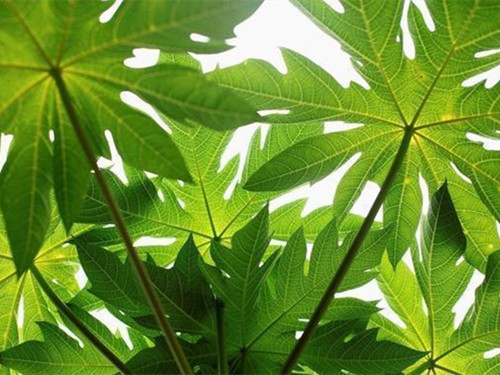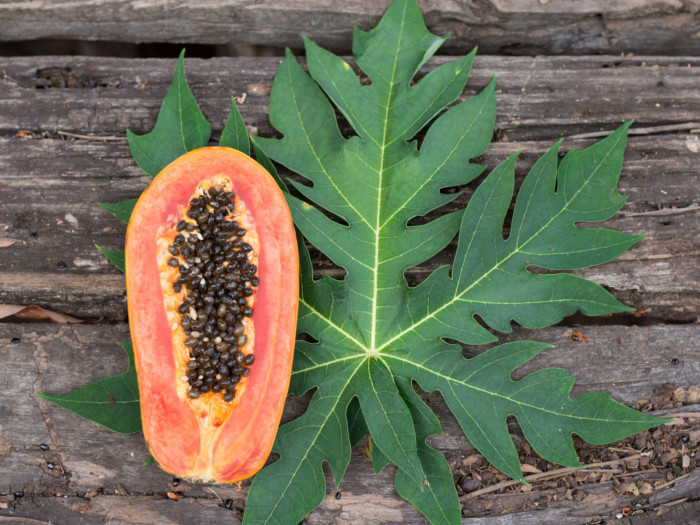Platelets are cells that circulate in the blood and bind together when damage occurs to blood vessels. For example, when you get cut, platelets clump together to form a blood clot, preventing the wound from bleeding further. Platelets also help recruit other clotting factors to the area. However, some people have lower than normal platelet counts, which is called thrombocytopenia and can be due to a variety of conditions and lifestyle factors. You may need some medications to increase your platelet levels, and you can also take some foods and supplements to support platelet production and increase your platelet count. While it’s important to work with your healthcare provider to get an accurate diagnosis, there are ways you can help increase your platelet count on your own. For example, taking supplements containing papaya leaves is thought to be beneficial, and do you know how they work?

Papaya leaves
Papaya leaf extract and platelets
The papaya plant (Carica papaya) is a tree native to tropical regions of the Americas. Its leaves have been used traditionally for various medicinal purposes. Papaya leaf extract contains beneficial compounds such as phenolic acids, flavonoids, and alkaloids, and is probably best known in areas where dengue fever is endemic. Recently, papaya leaf extract has been researched for its potential positive effects on platelets. Some early research indicates that specific compounds in papaya leaf extract may support healthy platelet aggregation. One study published in Platelets found that mice fed papaya leaf extract had lower platelet aggregability when blood vessel walls were damaged compared to control mice. Another study in the Malaysian Journal of Medical Sciences showed that when volunteers took papaya leaf extract tablets for 14 days, they had significantly reduced platelet-activating factor (PAF) activity compared to baseline.
The researchers attributed these beneficial effects to leaf compounds like flavonoids, phenolic acids, and alkaloids. Compounds like phenolic acids are known to have antiplatelet effects by interfering with pathways like the arachidonic acid system that affect clotting. Alkaloids in the leaf may also directly inhibit platelet aggregation. However, further research is still needed to fully understand how papaya leaf extract influences platelet function and confirm its efficacy. The early results are promising for those looking to support healthy platelet activity naturally.
Other natural ways to increase platelets
The combination of the World Health Organization’s nutritional guidelines and elements of a macrobiotic diet may improve fatigue and platelet counts. Recommendations include eating enough calories, water, and foods rich in folate, iron, B12, serotonin, chlorophyll, and vitamins C, D, and K, with whole grains, fruits, vegetables, healthy fats, and plant proteins, and also allowing for small amounts of lean animal protein. Avoid alcohol and foods high in sodium, sugar, saturated fat, and trans fat. For those who find this diet inadequate, the non-alcoholic Mediterranean diet is another good option.
Mediterranean diet
The Mediterranean diet is a plant-based diet with whole grains, vegetables, fruits, nuts, and legumes that has been shown to maintain platelet counts. It may also increase platelet levels over time, and it requires a high intake of healthy fats such as fish, olive oil, and avocado. Its saturated fat, sodium and sugar are limited. If you’re looking for a more organized diet, you can follow the Mediterranean diet, but avoid alcohol.
Folic acid
Folic acid is a B vitamin involved in the repair and growth of blood cells. Folate is a nutrient needed to produce platelets, red blood cells and white blood cells, and a deficiency can also lead to low platelet counts and an increased risk of bleeding. Spinach is an excellent source of folate (vitamin B9), and other good choices for other folate-rich foods include other leafy greens such as mustard greens, beef liver, beans, rice, peanuts, and asparagus. Many breakfast cereals are also rich in folic acid.
Vitamin B12
Vitamin B12 deficiency is one of the possible causes of thrombocytopenia. This nutrient is necessary for the production of platelets. Increasing your intake of nutritional yeast and other sources, such as clams, tuna, and salmon, can help maintain healthy platelet levels. If you do any vegetarian or vegan cooking, nutritional yeast is most likely already a staple of its cheesy flavor. With the exception of beef liver, nutritional yeast has the highest amount of vitamin B12 per serving.
Iron
Low platelets are associated with iron deficiency. Dark chocolate is a good source of iron, only oysters and white beans have higher levels of iron per serving. While iron is best known for its role in forming red blood cells, its relationship to healthy platelet levels has been relatively underestimated until recently. The formation of large cells in the bone marrow (megakaryocytes) requires iron) is broken down into fragments to form platelets. Other good sources of iron include spinach, lentils, and tofu.
Vitamin C
Vitamin C helps absorb iron, which may increase your platelet count. Vitamin C supports the normal functions of platelets, such as aggregation (aggregation) and adhesion (adhesion). Other foods rich in vitamin C include red peppers, broccoli, strawberries, Brussels sprouts, and citrus fruits such as oranges and grapefruit.
Vitamin D
Vitamin D helps make bone marrow, which is necessary for the production of platelets.
Vitamin K
Vitamin K is a nutrient needed for blood clotting. Not getting enough of this vitamin may lead to excessive bleeding. Kale has the highest vitamin K content of almost any food. Vitamin K plays a vital role in blood clotting. In addition to kale, spinach, kale, and broccoli are also excellent sources of vitamin K.
Chlorophyll
Chlorophyll is the pigment that gives plants, algae and some bacteria their green color. It raises platelet levels in athletes. When used in combination with iron, it increases red blood cells (RBCS) in hemodialysis patients. This may also increase the platelet count.
Serotonin
Serotonin is a hormone stored in platelets that helps blood clot. When bleeding occurs, platelets bind to the blood and release serotonin.
In addition, probiotics, melatonin and other elements can also increase platelet count. Although many of these nutrients are available in supplement form, it is best to try to get them from food. Certain foods that are high in vitamins and minerals can help your body make and maintain platelets in your blood. Eating a healthy diet is essential to restoring health.
Reference:https://www.ncbi.nlm.nih.gov/pmc/articles/PMC7219447/
- Dandelion Extract: What It Is, Benefits, Uses and Side Effect - April 23, 2024
- Is Berberine Extract Help For Weight Loss? - April 11, 2024
- Why Is Pysllium Husk Powder A Popular Meal Replacement Ingredient? - April 3, 2024



